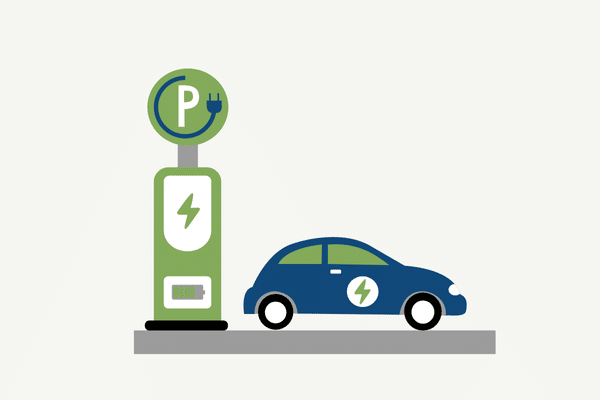
The Inflation Reduction Act (IRA) contains funding for energy programs, including a $7,500 tax credit for electric vehicles (EVs). The law also provides tax credits for commercial trucks and home charging installations in rural areas. Plus, some used electric vehicles are also eligible for an incentive.
💵 How Much is the Electric Vehicle Tax Credit?
Until recently, only a small number of consumers were benefiting from EV tax credits. With Tesla and General Motors nearing their 200,000-vehicle sales cap and their long-standing tax credits set to expire, this new federal tax credit came just in time.
According to the Alternative Fuels Data Center, approximately 30 models are eligible for up to \$7,500 in tax credits, but only if their final assembly takes place in North America and 40 percent of their metals are mined in North America. Of the 30, ten have already reached their manufacturer cap. Additionally, there is an incentive of up to $4,000 on used electric cars.
“If you’re interested in an EV or a plug-in hybrid and it qualifies for a tax credit today, don’t wait, because it might not qualify next year,” says Jake Fisher, senior director of Consumer Reports’ Auto Test Center. “But if you’re considering a used EV, it is worth waiting.”
Other EV Provisions
In addition to federal tax incentives, the following IRA provisions apply:
- ✅ No More Caps: Removes the 200,000-vehicle cap on tax credits that made EVs and plug-in hybrids from Tesla, GM, and Toyota ineligible for tax credits.
- ✅ Price Restrictions: Ends tax credits for pricey EVs like the GMC Hummer EV, Lucid Air, and Tesla Model S and Model X.
- ✅ Assembly Requirements: Vehicles not assembled in North America, including the BMW i4, Hyundai Ioniq 5, Kia EV6, Subaru Solterra, and Toyota bZ4X, no longer qualify.
- ✅ Income Caps: Adds an annual adjusted gross income cap for buyers of \$150,000 for single tax filers, \$225,000 for heads of households, and \$300,000 for married couples filing jointly.
- ✅ Mineral Sourcing Restrictions: Starting in 2024, if any minerals or components are sourced from “foreign entities of concern,” including China or Russia, the vehicle will not qualify for any tax credit.
🚗 Qualifying Vehicles – For Now
According to the IRS, the models that may qualify for a tax credit include:
2024 Models:
- Audi Q5 PHEV
- BMW 3 Series PHEV, BMW X5 PHEV
- Chrysler Pacifica PHEV
- Ford Escape PHEV, F-150 Lightning, Mustang Mach-E, Transit Van
- Jeep Grand Cherokee PHEV, Wrangler 4xe PHEV
- Lincoln Aviator PHEV, Corsair PHEV
- Lucid Air
- Nissan Leaf
- Rivian R1S, R1T
- Volvo S60 Recharge PHEV
2023 Models:
- BMW 3 Series PHEV
- Mercedes-Benz EQS
- Nissan Leaf
Potential 2024 Models:
- Tesla Model 3, Model S, Model X, Model Y (subject to eligibility)
- Cadillac Lyriq
- GMC Hummer Pickup/SUV (subject to eligibility)
- Chevrolet Bolt, Bolt EUV
💡 Vehicle Price Cap
According to Consumer Reports, “All the vehicles on both of these lists will still be subject to new caps on how much vehicles can cost. For SUVs, pickup trucks, and vans, the threshold is $80,000. For sedans, hatchbacks, wagons, and other vehicles, the credit cuts off at $55,000.”
❓ Did You Take Possession After August 16th?
What if you bought a qualifying car before August 16, but didn’t take possession of it until on or after August 16? Can you still claim the credit? The IRS says yes!
“Individuals who entered into a written binding contract to purchase a new qualifying electric vehicle before August 16, 2022, but do not take possession of the vehicle until on or after August 16, 2022 (for example, because the vehicle has not been delivered), can claim the EV credit based on the rules that were in effect before the Inflation Reduction Act’s enactment.”
Take Your Next Steps
Check Vehicle Eligibility:
Before signing any contract, ensure your vehicle qualifies by entering its VIN into the National Highway Traffic Safety Administration’s free VIN Decoder.
Do Your EV Tax Due Diligence:
If an EV is on your wish list, do your homework to avoid tax-time disappointment. If you have questions about which vehicles qualify for the tax deduction and how much you may be able to claim, give us a call.
Ready to Drive Green and Save Green?
Let’s connect! Our team is here to help you navigate the tax benefits of electric vehicles. Give us a call today, and we’ll help you make the most of your EV investment. Don’t wait—let’s make your green dreams a reality together!
